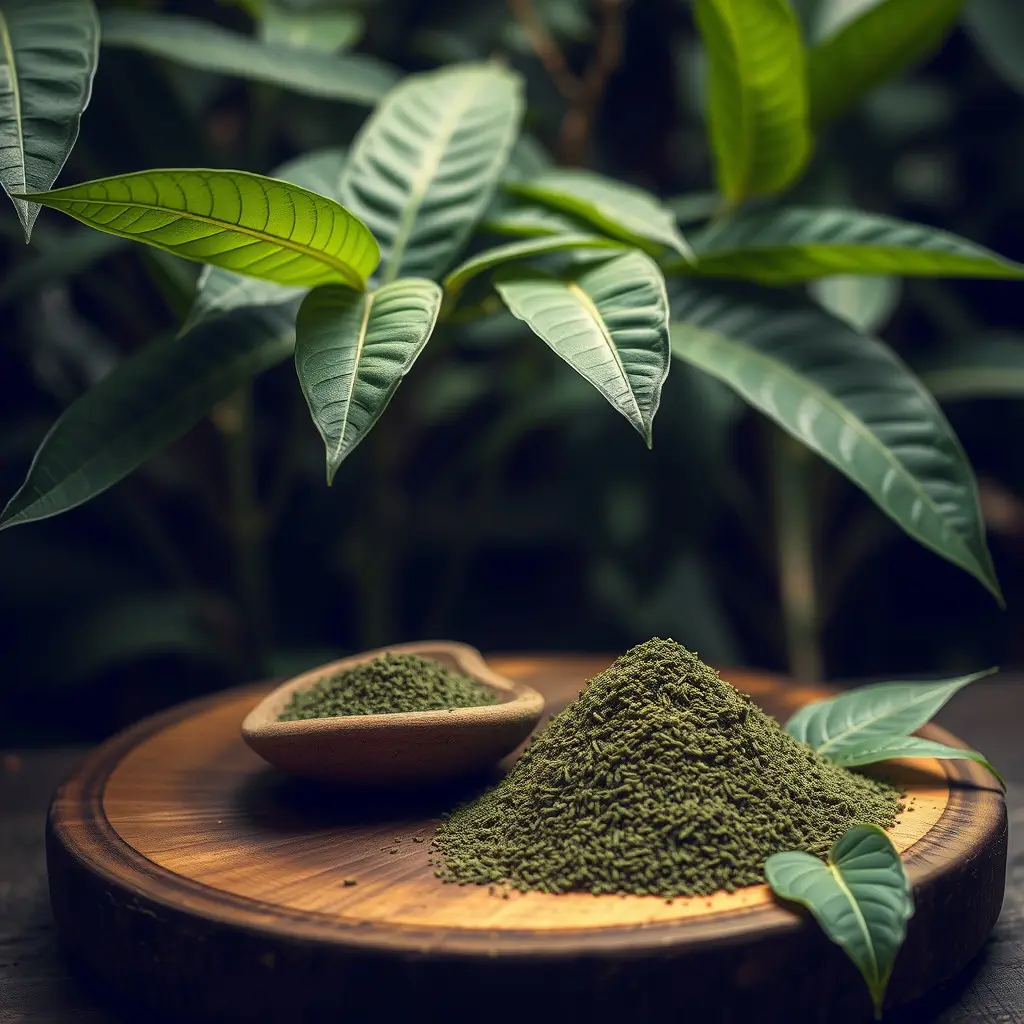Kratom, derived from the Mitragyna speciosa tree, is a subject of scientific interest for its potential anti-inflammatory effects and is currently recognized as a dietary supplement in Texas, allowing for its possession, sale, and consumption across the state. Its alkaloids, mitragynine and 7-hydroxymitragynine, are believed to interact with opioid receptors and modulate the immune system, offering relief for conditions like arthritis and fibromyalgia. However, legal status varies within Texas, as local jurisdictions may have enacted specific ordinances that could affect its legality at the county or city level. Users are advised to stay informed on the evolving legal landscape and procure kratom from reputable sources. The FDA has issued warnings about potential risks of dependency and adverse health effects associated with kratom, emphasizing the importance of consulting healthcare professionals before using it, given its interactions with other medications and ongoing research into its therapeutic benefits. Due to the dynamic nature of laws regulating kratom, it is crucial for individuals in Texas to verify current local regulations to ensure compliance with state and municipal statutes.
Kratom, a plant native to Southeast Asia, has garnered attention for its potential anti-inflammatory properties. This article delves into how kratom may aid in inflammation reduction and its current legal status in Texas. We’ll explore the scientific evidence supporting kratom’s effects, navigate its complex legal landscape within the state, and address safety considerations to provide a comprehensive overview of this intriguing botanical substance. Understanding “is kratom legal in texas” is crucial for those interested in its therapeutic potential while ensuring compliance with local regulations.
- Understanding Kratom's Role in Inflammation Reduction and Its Legal Status in Texas
- Exploring the Science Behind Kratom and Anti-inflammatory Properties
- Navigating Kratom Legality and Safety Considerations in Texas
Understanding Kratom's Role in Inflammation Reduction and Its Legal Status in Texas

Kratom, a tropical evergreen tree native to Southeast Asia, has garnered attention for its potential anti-inflammatory properties. The leaves of kratom contain alkaloids such as mitragynine and 7-hydroxymitragynine, which are believed to interact with the body’s opioid receptors and may contribute to its inflammation-reducing effects. Chronic inflammation is associated with a variety of health issues, and kratom’s alkaloids have been studied for their role in modulating the immune response, potentially offering relief from conditions like arthritis and fibromyalgia. Users report that kratom helps manage pain and inflammation, although scientific research is still evolving to fully understand these effects.
When considering the use of kratom for inflammation reduction, it’s important to be aware of its legal status. In Texas, kratom is legally available but is subject to certain regulations. As of my knowledge cutoff in 2023, kratom is not classified as a controlled substance at the federal level, which means it is legal nationwide, including in Texas. However, local ordinances and legislation can vary, and there have been efforts to regulate or ban kratom in certain areas within the state. Users should always verify the most current legal status of kratom in their specific locale within Texas to ensure compliance with local laws and regulations. It’s advisable to stay informed as legal landscapes can change, and purchasing kratom from reputable sources is crucial for both legality and safety.
Exploring the Science Behind Kratom and Anti-inflammatory Properties

Kratom, a tropical deciduous tree native to Southeast Asia, has garnered attention for its potential anti-inflammatory properties. Scientific research indicates that kratom contains alkaloids such as mitragynine and 7-hydroxymitragynine, which may contribute to its inflammation-reducing effects. These compounds are believed to interact with various receptors in the body, including opioid receptors, which could explain their anti-inflammatory actions. The anti-inflammatory potential of kratom is an area of active scientific investigation, with studies suggesting that it might modulate the immune response and inhibit certain inflammatory pathways.
The legal status of kratom varies across different regions in the United States. In Texas, as of my knowledge cutoff date, kratom is not explicitly illegal at the federal level but has been subject to various regulatory actions. The Texas Health and Safety Code includes kratom in the list of controlled substances, which means it is legally available for purchase and use within the state. However, local ordinances may impose additional restrictions, and the legal landscape can change. It’s always advisable to consult the latest regulations or legal counsel to understand the current status of kratom legality in Texas. Users interested in exploring kratom as a natural remedy for inflammation should be aware of these regulatory nuances to ensure compliance with local laws.
Navigating Kratom Legality and Safety Considerations in Texas

Navigating the legality and safety considerations of kratom in Texas requires a clear understanding of both state and federal regulations. As of the latest updates, kratom is considered a dietary supplement under Texas law, which means it is generally legal to possess, sell, and consume within the state’s borders. However, this status may vary at the county or city level, where some local jurisdictions have enacted their own ordinances regarding kratom sales and usage. It’s crucial for consumers to be aware of these nuances to avoid inadvertent legal infractions.
Safety considerations are equally important when discussing kratom use. The substance, derived from the leaves of the Mitragyna speciosa tree, is known for its effects on pain relief and mood enhancement, attributed to its alkaloids, including mitragynine and 7-hydroxymitragynine. While the FDA has issued warnings about kratom’s safety, citing potential risks of abuse, addiction, and negative health outcomes, many users report positive experiences with kratom when used responsibly. It’s advisable for individuals to approach kratom use with caution, especially considering the lack of long-term studies on its effects. Users should also be mindful of how kratom interacts with other substances they may be taking and consult with healthcare professionals before integrating kratom into their wellness regimen, particularly given the evolving legal landscape and ongoing research into its therapeutic potential. Is kratom legal in Texas? The answer is yes, under state law, but always verify local regulations to ensure compliance.
In conclusion, the potential of kratom as a natural approach for inflammation reduction presents intriguing possibilities for those seeking alternative remedies. The exploration of its anti-inflammatory properties, as detailed within this article, suggests that kratom could offer significant benefits. However, it is crucial to approach its use with caution and within the confines of the law, particularly in Texas. The legal status of kratom in Texas, a subject that has been clarified throughout this discussion, requires careful adherence to local regulations as they evolve. Prospective users must weigh the potential therapeutic effects against the current legal limitations and safety considerations. As research continues to unfold, it is hoped that clearer guidelines will emerge, providing a more definitive understanding of kratom’s role in managing inflammation. For those interested in exploring kratom as a part of their wellness regimen, doing so responsibly and informed by current scientific data remains essential.






